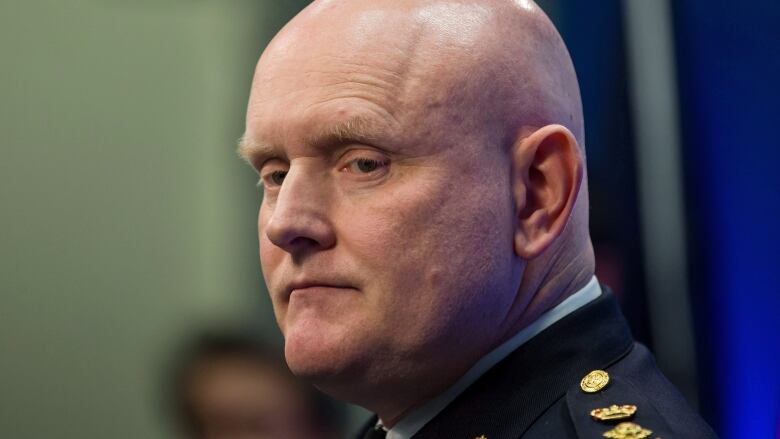Vancouver police report 'leaves a bad taste' for critics who say cops are becoming too political
Contentious study on social spending commissioned without participation of city called 'harmful'

A contentious new report on Vancouver's "social safety net"commissioned by the city's police department is reigniting concerns about whether the force is becoming inappropriately political.
The study, completed by Alberta-based HelpSeeker Technologies and released Wednesday morning, purports to pin the annual cost of providing social services in the city at an estimated $5 billion.
The study was commissioned by the Vancouver Police Department (VPD) without the participation of the city at a cost of $149,000 in public funding. VPD Chief Adam Palmer suggested at a newsconference Wednesday morning that it proves too much is being spent on the Downtown Eastside without proper co-ordination or oversight.
Coun. Christine Boyle said she was troubled by the implications.
"I think it's political, and I think it's harmful to the important, larger conversation that we should be having about systemic solutions to the overlapping crises we're in. That conversation can't and shouldn't be led by a police force."
She and other observers suggested this is another example of the increasing politicization of police in Vancouver, coming so soon after the Vancouver Police Union's unprecedented endorsement of Mayor Ken Sim and his ABC Vancouver slate in October's municipal election.
Then, just two days ago, union president Ralph Kaisers posted on social media about meeting with new federal Conservative Leader Pierre Polievre and other Tory MPs.
"All of it leaves a bad taste," Boyle said.
Thank you Hon. Poilievre, MPs Vis, Caputo & Morrison for meeting with us to discuss issues that our officers face here in Vancouver, and across all of BC. https://t.co/PcaQn78PYC
—@rkaisers_VPUPolitical scientist Stewart Prest of Quest University said the public should be very concerned about this trend toward police becoming involved in politics.
"This is not what we expect police to be doing with the funds that they're allocated," he said.
Prest said it's appropriate for police to provide insight and advice to lawmakers about the duties of policing and how best to perform them, but this report goes far beyond that, commentingon how a broad swath of unrelated services are funded.
"It makes us look differently at police," he said. "If they are so willing to torque their analysis to suit what would seem to be a political narrative then what else do we need to question?"
Chief says policeare 'not political entities'
Chief Adam Palmer was asked at Wednesday's news conference why this kind of analysis would be a matter for the police.
He responded that VPD officers "have a unique picture on the rollercoaster of life on what goes on in this city" and that the department has reason to be concerned about the situation on the ground in the Downtown Eastside.
Palmer went on to say that police are "not political entities" and "to me, it doesn't matter who the government of the day is."
But there have been serious questions about HelpSeeker's methodologies, most bitingly from Business in Vancouver columnist Rob Shaw, who described the report and the police summary of it as "misleading works of fiction."
In a written statement, Public Safety Minister Mike Farnworth concurred, accusing the police department of "spreading sensationalized and misleading numbers."
As for the new mayor, elected with the support of the police union, Sim demurred when asked about the appropriateness of the police commissioning a study like this. But he added that he didn't find the study to be useful and said the numbers don't seem well supported.
"This report isn't one that we're going to be relying a lot on when it comes to the evidence and data," he said.

For Downtown Eastside resident and former drug policy adviser Karen Ward, it's difficult not to question the motivations behind the report.
She suggested police in Vancouver and across North America have become increasingly active in politics since the Black Lives Matter protests of the summer of 2020.
"The message of the protest is that we do not need the police," Ward said. "And we really don't."
The reality on the ground, Ward said, is that the Downtown Eastside has been losing services over the last few years, including drop-in centres and peer-led mental health programs.
"As our social infrastructure breaks down because of lack of funding, austerity budgets and things like that, the police make themselves necessary," Ward said.
"If there's no one to call but the police for everything, then everyone's going to call the police."
Palmer was asked Wednesday if the report was designed to suggest more funding should go to the police and replied that the question is "not even relevant" to the research.
"It's not about getting more money for the police," he insisted.
With files from Karin Larsen












_(720p).jpg)


 OFFICIAL HD MUSIC VIDEO.jpg)
.jpg)



























































































